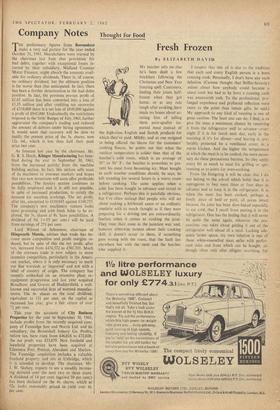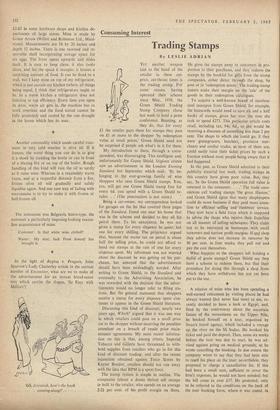Fresh Frozen
By ELIZAB ETH DAVID Mr butcher tells me that he's been dealt a few brickbats following the Christmas and New Year freezing spell. Customers, finding their joints half- frozen when they got home, or at any rate tough after cooking, have made no bones about ac- cusing him of selling them poor-quality im- ported meat instead of the high-class English and Scotch products for which they've paid. Mildly, and as one resigned to being offered the blame for the customers' cooking fiascos, he points out that when the outdoor temperature is colder than that of the butcher's cold room, which is an average of 33° to 36° F., the butcher is powerless to pre- vent his meat from becoming icy. Meat bought in such weather conditions should, he says, be left standing for several hours in a warm room before cooking. The same applies when a joint has been bought in advance and stored in a refrigerator. Perhaps this is painfully obvious, but I've often noticed that people who will set about making a bdchamel sauce or an ordinaiy omelette with as much thought as if they were preparing for a driving test are extraordinarily fearless when it comes to cooking the joint. They treat their meat in the jauntiest way and, however otherwise modest about their cooking skill, it doesn't occur to them, if something goes wrong with the roast, that the fault lies anywhere but with the meat and the butcher who supplied it.
I suspect that this all is due to the tradition that each and every English person is a born roasting cook. Personally, I don't have any such delusion. (Careme thought that Brillat-Savarin's axiom about how anybody could become a sauce cook but had to be born a roasting cook was amateurish tosh. To the professional, pro- longed experience and profound reflection were more to the point than innate gifts, he said.) My approach to any kind of roasting is one of great caution. The least one can do, I find, is to give the meat a maximum chance by removing it froM the refrigerator well in advance—over- night if it is for lunch next day, early in the morning if it's, for dinner—and leaving it, pre- ferably protected by a ventilated cover, in a warm kitchen. And the higher the temperature at which the meat is to be cooked, the more neces- sary do these precautions become. So they apply every bit as much to meat for grilling or spit- roasting as to joints for oven-cooking.
From the foregoing it will be clear that I do not belong to the school which holds that it is outrageous to buy meat three or four days in advance and to keep it in the refrigerator. It is when the meat • has been cooked, perhaps a lovely piece of beef or pork, all juices intact because the joint has been slow-baked especially to eat cold, that I recoil from putting it in the refrigerator. One has the feeling that it will never be quite the same again, whatever the pre- cautions one takes about getting it out of the refrigerator well ahead of a meal. Lacking ade- quate larder space, my own solution is one of those white-enamelled meat safes with perfor- ated sides and front which can be bought, al- though often only after diligent searching, for E2-£3 in some hardware shops and kitchen de- partments of large stores. Mine is made by Green Arrow (Willett and Robinson Ltd., Maid- stone). Measurements are 16 by 20 inches and depth 12 inches. There is one recessed and re- , movable shelf incorporating storage space for six eggs. The front opens upwards and slides back. It is easy to keep clean, it also looks clean, and for the space it occupie3 it houses a surprising amount of food. It can be fixed to a wall, but I keep mine on top of my refrigerator, which is just outside my kitchen (where, all things being equal, I think that refrigerators ought to be. In a warm kitchen a refrigerator does not function at top efficiency. Every time you open its door, warm air gets in, the machine has to work overtime and the food stored cannot be fully protected) and cooled by the one draught in the house which has its uses.
Another commodity which needs careful treat- ment in very cold weather is olive oil. If it freezes, the worst thing you can do is to give it a shock by standing the bottle or can in front of a blazing fire or on top of the boiler. Rough handling of this kind will ruin the oil as surely as it ruins wine. Whereas in a reasonably warm room, and at a respectful distance from a fire, frozen olive oil will gradually and 'safely liquidise again. And one sure way of failing with mayonnaise is to try to make it with frozen or half-frozen oil.
The restaurant was Belgravia bistro-type, the customer a particularly imposing-looking mascu- line acquaintance of mine.
Customer: Is that white wine chilled?
Waiter: My dear, lack Frost himself has brought it.
* In the light of Regina v. Penguin, John Sparrow's'Lady Chatterley article in the current number of Encounter, what are we to make of the advertisement for an instant bread-sauce mix which carries the slogan, `So Easy with Mellors'?
'Oh, Jeremiah, how's the book
coming along?'• • •



































 Previous page
Previous page